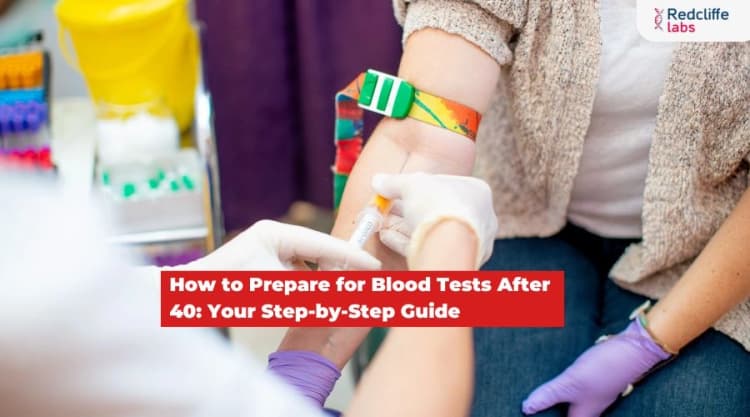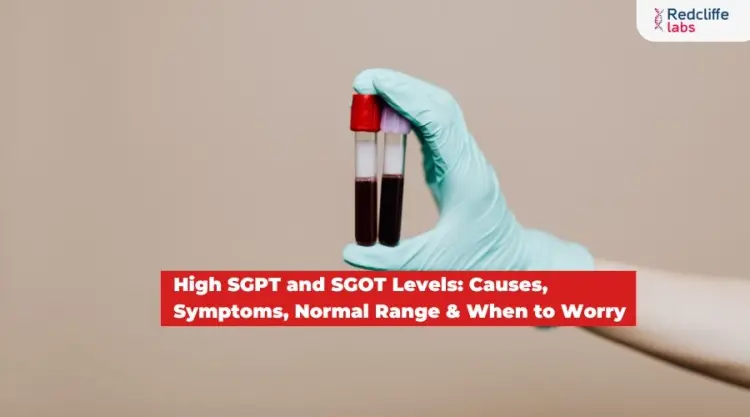Blood
Unlock special
discount on
this package
Login to Unlock 🔓
NABL Accredited lab*

Booking Benefits Unlocked Worth FREE 799

Report Consultation

Diet Plan
*Available once your report is generated.
At Redcliffe Labs, we have a single goal: to give India its right to quality diagnostics.
Customers served
Tests Processed Everyday
Cities
Collection Centres
World Class In-house Labs
Home Collection Experts
1 Test Parameters
Fibrinogen Level
1 PARAMETER INCLUDED
1 PARAMETER INCLUDED
- Fibrinogen Level
Top Booked Health Checkup Packages
Reports in 12 hours
|Parameters 94
Reports in 12 hours
|Parameters 96
Reports in 12 hours
|Parameters 89
Reports in 12 hours
|Parameters 96
Reports in 12 hours
|Parameters 90
Verified by Medical Expert

WRITTEN BY
Komal Daryani

MEDICALLY REVIEWED BY
Dr. Mayanka Seth
Introduction to Fibrinogen Test
A Fibrinogen test measures your blood's fibrinogen levels, a vital blood-clotting protein.
Fibrinogen, also known as Factor I, is produced by the liver, plays together to form blood clots, and helps stop bleeding when tissues or blood vessels are damaged.
The test detects fibrinogen deficiency, clotting disorders, and inflammation levels. Doctors recommend it to evaluate clotting disorders, excessive bleeding, and the risk of developing cardiovascular diseases. The Fibrinogen test helps diagnose disseminated intravascular coagulation (DIC), liver disease, or conditions like hypofibrinogenemia (low fibrinogen levels) and hyperfibrinogenemia (high fibrinogen levels).
If your doctor has recommended the fibrinogen test, you can choose Redcliffe Labs. The professional here will resolve all your queries related to the test and provide you with the best diagnostic services. Book your fibrinogen blood test today if you have any risk of clotting disorders.
Test details in brief
| Also Known As | Serum Fibrinogen Test, Plasma Fibrinogen, Factor I, Factor 1 Assay, Hypofibrinogenemia Test, Fibrinogen Activity, Fibrinogen Antigen Test, Cardiac Fibrinogen |
| Purpose It measures | The test evaluates blood clotting ability by measuring fibrinogen levels in the blood. |
| Preparation | Do not take any over-the-counter medicine without confirming with your Doctor. |
| Fasting | Not Required |
| Get Reports | Within 48 hours |
| Cost | ₹760 |
Purpose of the Fibrinogen Test
A fibrinogen test evaluates the blood's protein level and ability to form blood clots. It is used to diagnose, monitor, and screen for several conditions that affect blood clotting.
- Assess blood clotting function—Fibrinogen is crucial in forming blood clots. The test helps determine if a person has abnormal clotting activity, which can lead to excessive bleeding or clot formation.
- Diagnosing Bleeding Disorders: Low fibrinogen levels indicate conditions that cause excessive bleeding, such as disseminated intravascular coagulation (DIC), liver disease, or inherited fibrinogen deficiencies.
- Evaluating Risk of Blood Clots (Thrombosis)- High fibrinogen levels may indicate an increased risk of stroke, heart attack, deep vein thrombosis (DVT), and pulmonary embolism.
- Monitoring Liver Function- Since fibrinogen is produced in the liver, low levels may signal liver disease, cirrhosis, or hepatitis.
- Assess fibrinogen activity—The fibrinogen test evaluates how long it takes for fibrinogen to form a blood clot. Thrombin is added to a blood sample in a test tube to stimulate coagulation. The amount of fibrinogen incorporated into the blood clots is called active (or functional) fibrinogen.
When should you get the Fibrinogen Test?
The fibrinogen test evaluates the blood's clotting ability. It is performed if signs of abnormal blood clotting, such as excessive bleeding or blockage of veins or arteries, called thrombosis.
A healthcare provider may also order a fibrinogen test if the PT or PTT results indicate prolonged clotting times, even if you do not have visible symptoms. Doctors may order a Fibrinogen Test if a patient has:
- Unexplained bleeding or bruising
- Frequent blood clots
- Suspected DIC or liver disease
- Chronic inflammatory conditions
- A history of cardiovascular disease
What does the Fibrinogen Test detect?
A fibrinogen test is recommended to evaluate or diagnose the following conditions-
- DIC (Disseminated intravascular coagulation)- This is a serious condition in which the body produces too much thrombin and fibrin, which may cause a significant decrease in fibrinogen level. Fibrinogen testing and other blood tests might be needed to confirm a diagnosis of DIC.
- Bleeding or Bruising—If you experience unusual bleeding, excessive bruising, or bleeding from cuts or injuries, your doctor may recommend a fibrinogen test to detect clotting issues.
- Excessive Clot Formation—If there is a history or symptoms suggesting blood clots—such as deep vein thrombosis (DVT), pulmonary embolism, or recurrent strokes—the test can help determine if high fibrinogen levels contribute to these events.
- Liver Disease—The liver produces fibrinogen; however, conditions like cirrhosis or hepatitis might affect its levels. The test can be part of a panel to assess overall liver function.
- Assessment of Inflammatory or Cardiovascular Risk—High fibrinogen levels are sometimes linked to chronic inflammation and an increased risk of cardiovascular events. The test might help assess risk in patients with risk factors for heart disease.
- Inherited Fibrinogen Disorders—If your family has a history of clotting or bleeding disorders, the test can be a preventive measure or a tool for early diagnosis.
You should take the fibrinogen test if you have symptoms or a medical history that suggests a problem with blood clotting or bleeding, liver disease, or risk factors for cardiovascular conditions.
Preparation for the Fibrinogen Test
Fibrinogen test is a simple blood test that requires no special preparation. Here is what you need to keep in mind before taking the fibrinogen test-
- Consult your doctor and discuss whether you have taken your medications, as some might impact your test results.
- You do not need to fast before the test.
- Stay hydrated before the test for smooth blood flow.
Fibrinogen Test Procedure
The Fibrinogen test is a blood test. The blood drawing process is simple, unlike other blood tests. Here is the step-by-step procedure of the Fibrinogen test-
- The healthcare provider will ask you to fold your sleeves and observe the nerve to collect the blood sample.
- He will then clean the arm area with an antiseptic solution.
- He then inserts a small needle into the vein to draw a blood sample.
- The blood draw process will take only a few minutes. You might feel a quick pinch or sting when the needle is inserted, but the pain will get normal in a few seconds.
- After collecting the sample, the healthcare provider removes the needle and applies a small bandage or cotton ball to the puncture site to stop the bleeding.
- After the sample collection, you can resume your daily activities normally.
- The blood sample is sent to a laboratory, where the lab professionals and technicians measure the amount of fibrinogen using specialized equipment and methods.
- The fibrinogen test results will be available within 48 hours of sample collection.
When you receive the fibrinogen test results, consult your doctor. Your healthcare provider will review and discuss the results with you and explain your overall health and any symptoms you may be experiencing.
What do the Fibrinogen Test reports indicate?
The fibrinogen test results typically show the amount of active fibrinogen in milligrams per deciliter, which will be compared to their reference range.
Fibrinogen test normal range- Most labs consider fibrinogen levels between 200-400 mg/dL normal.
High Fibrinogen Levels- Higher than normal fibrinogen levels indicate a higher risk of certain conditions-
- Blood clotting- Blood clots can lead to conditions like deep vein thrombosis (DVT) and pulmonary embolism or even contribute to heart attack and stroke.
- Inflammation: Fibrinogen is an acute-phase protein, meaning its levels rise in response to inflammation. Infections, autoimmune disorders (e.g., rheumatoid arthritis), or chronic inflammatory diseases can increase fibrinogen levels.
- Cardiovascular Disease: High fibrinogen can increase the risk factor for cardiovascular events since it can contribute to atherosclerosis (the buildup of plaques in blood vessels).
Low Fibrinogen Levels- Lower than normal fibrinogen levels indicate a bleeding risk and could be associated with:
- Bleeding Disorders: Conditions such as disseminated intravascular coagulation (DIC) or congenital fibrinogen deficiencies can result in low fibrinogen levels, leading to excessive bleeding.
- Liver Disease: Since fibrinogen is produced in the liver, diseases like cirrhosis or severe hepatitis can reduce production, resulting in lower levels.
- Other Conditions: Severe malnutrition or rare genetic disorders may lead to reduced fibrinogen levels.
Consult your reports with your doctor, who can interpret the test results based on your medical history and other relevant factors.
The healthcare provider may suggest additional tests such as prothrombin time [PT], activated partial thromboplastin time [aPTT], and complete blood count [CBC]) and your overall clinical picture.
What if the Fibrinogen Test reports are abnormal?
Fibrinogen disorders are associated with abnormal function and quantity of fibrinogen.
Abnormal fibrinogen can be divided in the following ways:
- Afibrinogenemia- Afibrinogenemia is a rare congenital disorder characterized by the complete absence of fibrinogen in the blood.
- Hypofibrinogenemia- Hypofibrinogenemia refers to lower-than-normal levels of fibrinogen in the blood. It may be congenital (present at birth) or acquired.
- Dysfibrinogenemia—Dysfibrinogenemia is a condition in which the fibrinogen in the blood is structurally abnormal or dysfunctional, even though its levels (antigen levels) might be normal.
- Hypodysfibrinogenemia—Hypodysfibrinogenemia is a combined condition characterized by reduced levels of fibrinogen (hypofibrinogenemia) and dysfunctional fibrinogen (dysfibrinogenemia).
Abnormally high fibrinogen levels might be due to the normal body response to injury, acute stress, infection, or inflammation. They can also occur due to pregnancy, aging, obesity, tobacco use, and insulin resistance.
Who should take the Fibrinogen Test?
The Fibrinogen test is recommended in the following conditions-
- People with cardiovascular risk factors
- Bleeding disorders
- Undergoing surgery
- Having liver disease signs
- Pregnant women and those with suspected inflammatory conditions
What are the common symptoms related to Abnormal Fibrinogen Levels?
Abnormal fibrinogen levels can show various symptoms, whether the levels are lower or higher than normal. Here are the common symptoms-
Low Fibrinogen Levels (Hypofibrinogenemia)
- Easy bruising
- Excessive bleeding
- Heavy menstrual bleeding
High Fibrinogen Levels (Hyperfibrinogenemia)
- Increased clotting risk (thrombosis (DVT), pulmonary embolism, heart attacks, or strokes)
- Risk of infections, autoimmune diseases, or chronic inflammatory states.
- Fever, fatigue, joint pain
If you experience any unusual symptoms such as unusual bleeding or bruising or if you have risk factors for clotting disorders or inflammatory conditions, discuss with your doctor. They can determine whether a fibrinogen test and other diagnostic evaluations are appropriate to help identify the underlying cause and guide treatment.
Fibrinogen Test price at Redcliffe Labs
The fibrinogen test cost at Redcliffe Labs is very affordable. You must book your appointment online or contact our customer executives to book your test. They will guide you through the process and help you in booking. The professionals are very polite and will answer all your queries. All our labs follow the highest quality standards and ensure you get the best test results. With 50+ internal and external quality control checks following Six Sigma processes, we ensure that we provide 100% report correctness. Our labs are equipped with fully automated machines with the latest technology. We are trusted by more than 50,000 doctors across India. Looking to know more about us? Visit the website or call us today! Also, book your blood test for fibrinogen today to know your health status.
5 Simple Steps to Manage Your Health with Redcliffe Labs
Quick, Simple & Convenient; trusted care delivered to your doorstep.

Start Your Online Booking
Open the Redcliffe Labs website/app. Select the test or package and enter your details. Schedule the service for your preferred slot.

Live Tracking
Stay updated with real-time tracking for a smooth and timely home sample collection.

Sample Collection
Our certified experts ensure a smooth, hygienic, and fully compliant sample collection experience.

Doctor-Verified Smart Reports
Every report is clinically checked by expert doctors and shared with smart, actionable insights.

Your Health Journey Continues Post Reports
Consult with our expert medical team to get actionable insights to improve your health.
Nearby Labs(9)
Redcliffe Labs Noida

MC-5280
Redcliffe Collection Center
Redcliffe Collection Center
Redcliffe Collection Center
Redcliffe Collection Center
Redcliffe Collection Center
Redcliffe Collection Center
Redcliffe Collection Center
Redcliffe Collection Center
Frequently Asked Questions
What is the fibrinogen test for?
What is the fibrinogen test price?
What happens if fibrinogen is high?
What are the normal fibrinogen levels?
What causes low fibrinogen levels?
How should I prepare for a fibrinogen blood test?
Are there any risks associated with the test?
What causes low fibrinogen levels?
How long does it take to get the fibrinogen test results?
What are the symptoms of abnormal fibrinogen levels?
Does fibrinogen affect PT or PTT?
Does stress increase fibrinogen?
Can I book a Fibrinogen Level Test near me?
Can I book a home collection for a Fibrinogen Level Test?
Health Articles & Blogs
My Health
Stay informed with our expert health articles and blogs. Explore comprehensive guides on diseases, nutrition, preventive care, and wellness tips to help you make better health decisions.
How to Prepare for Blood Tests After 40: Your Step-by-Step Guide

Why is PCOS Continuously Rising in Women?

10 Healthy Holi Recipes for Your Fitness Goals in 2026
Looking for healthy Holi recipes? Discover 10 festive dishes that support your fitness goals while keeping celebrations delicious.

Importance of Heart Health Before Pregnancy: Everything You Need to Know

Migraine Treatment at Home: Effective Ways to Relieve Migraines Naturally

High SGPT and SGOT Levels: Causes, Symptoms, Normal Range & When to Worry

Brain Hemorrhage Symptoms: Early Warning Signs, Types, Causes & When to Seek Emergency Care

What is SGPT in Blood Reports? Everything You Need to Know
Explore My Health
